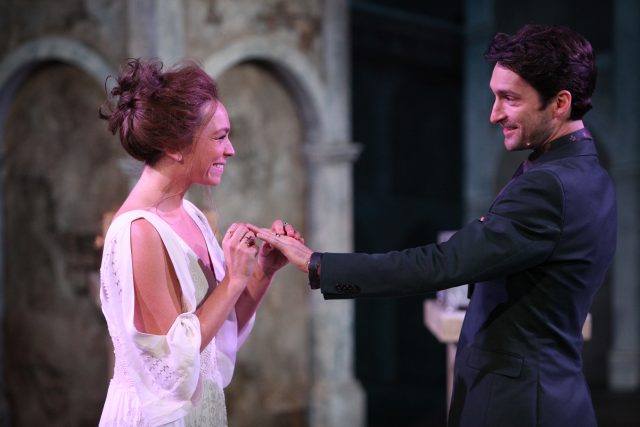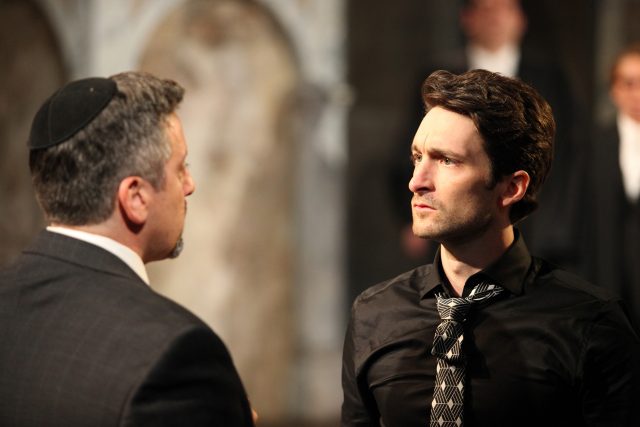
Credit: David Blue
At Bard on the Beach until September 16, 2017
604-739-0559/bardonthebeach.org
Posted July 8, 2017
I should probably never see The Merchant of Venice ever again: it makes me crazy. I know, I know, anti-Semitism was rife in Shakespeare’s time as well as in the period about which Shakespeare was writing and so the play is historically correct. Some scholars say it was the Bard’s intention to point out the injustice of anti-Semitism but the conclusion of The Merchant of Venice doesn’t bear that out; audiences don’t learn anything useful by the complete humiliation and bankrupting of Shylock.
Early in the play, we see Shylock (Warren Kimmel), the rich, money-lending Jew, being tripped, spat upon and reviled by young men and women who, when they have money trouble, are happy to go running to him.
Young Bassanio (Charlie Gallant) has frittered away his fortune and now wants to marry a rich woman to solve his financial problems. Needing to look well heeled in order to impress the heiress Portia (Olivia Hutt), Bassanio turns to his affluent friend Antonio (Edward Foy) whose fortune, unfortunately, is tied up in his shipping business. When Antonio offers to back the loan of 3,000 ducats, Shylock agrees but puts a condition on the loan: if Antonio fails to pay back the loan on time, he may take a pound of Antonio’s flesh. It’s a wicked bargain but these Venetian lords and ladies have been abusing Shylock for a very long time. It’s payback time.

Credit: David Blue
In this production, directed by Nigel Shawn Williams, the young Venetians – with the exception of Antonio – are a bunch of self-obsessed young adults while Kimmel’s Shylock is mature, dignified and decent. Impossible not to sympathize with the Jew.
But that’s only part of what makes me crazy. The other issue is Portia: noble, refined, intelligent and successfully wooed by n’er-do-well Bassanio. If we are supposed to believe they have the potential for a good match, Shakespeare really got it wrong. C’mon, Portia, give Bassanio the old heave-ho.
Shifting the action to present-day Venice (with some trendy b/w clothes by costume designer Drew Facey), the problems of the play are only exacerbated. Anti-Semitism may be historically accurate but spitting in the face of a Jew in present-day Venice would probably result in an assault charge. And today, a well educated, upper-class woman like Portia wouldn’t feel she had to follow her dead father’s ‘game’ regarding which of the various suitors she marries. And she likely wouldn’t fall for a fortune-hunting loser like Bassanio. Gallant’s Bassanio is hyped up, looks like he’s on uppers and he comes across as a jerk with no redeeming qualities. Plays don’t always work when they are contemporized; Merchant is one of these.

Credit: David Blue
Hutt, recently graduated from Studio 58, is so composed, so centred and so thoughtful in the role, she almost makes the play work. Her Portia is beautiful and elegant with a few breaks – appropriately – into girlish, blushing excitement over Bassanio. It’s an almost impossible challenge but Hutt makes the best of it.
Kimmel makes, for the most part, a Shylock that gets our sympathy. In spite of Portia’s wonderful, oft quoted “The quality of mercy is not strained” monologue, the utter humiliation and bankrupting of Shylock is, to say the least, abhorrent. And although I think we should feel sympathy for Shylock’s daughter Jessica (Carmela Sison), the fact that she steals from her father and runs off with another of ‘the boys’ doesn’t endear her to us.
I do, however, really like the way director Williams concludes this production (as opposed to how Shakespeare ended the play.) It’s not all happily-ever-after: Portia stands alone, Bassanio and the merrymaking wastrels have run off, puffed up with their courtroom success. “Nothing I see is good without respect”, Portia declares thoughtfully – maybe sadly. Maybe, just maybe, Portia is having second thoughts. Where Shakespeare equivocates, Williams make his point – albeit as the curtain falls.

Credit: David Blue

